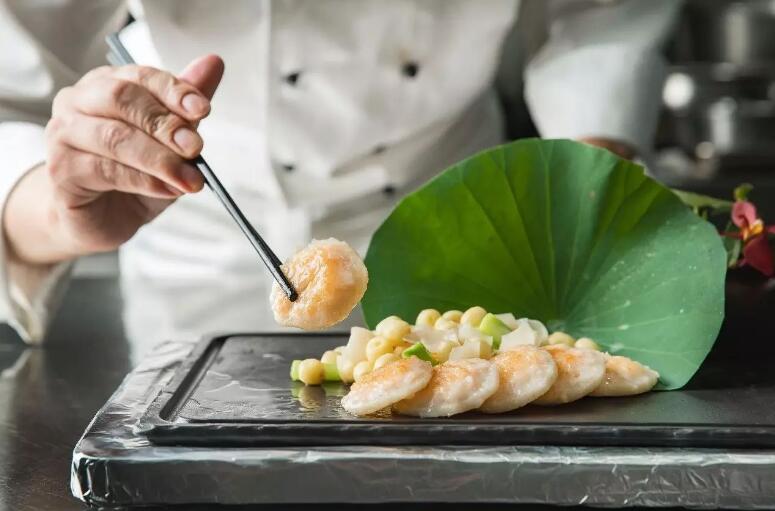 厨师培训计划出身的粤菜大厨
厨师培训计划出身的粤菜大厨
He once struggled to put food on the table for his ailing family – today, this chef shares his mastery of Cantonese cuisine with diners
译文简介
朱能清先生因为参加粤菜厨师培训计划而改变了自己和家人的生活。
正文翻译

He once struggled to put food on the table for his ailing family – today, this chef shares his mastery of Cantonese cuisine with diners
他曾经努力为他生病的家人提供食物——今天,这位厨师跟食客分享他高超的粤菜手艺。
In a village in Guangdong province, chef Zhu Nengqing can be seen crouching in the fields to inspect his crops of vegetables before going to his kitchen at Xueshan Linyuan Agritainment restaurant to start his daily routine.
在广东省的一个村庄里,可以看到厨师朱能清蹲在地里检查蔬菜作物,然后去雪山林园农家乐餐厅的厨房开始他的日常工作。
在广东省的一个村庄里,可以看到厨师朱能清蹲在地里检查蔬菜作物,然后去雪山林园农家乐餐厅的厨房开始他的日常工作。
Zhu washes a small squash known as a chayote, pats it dry, then cuts it into several rounds and meticulously fills the centre of each one with a meat mixture. After they are steamed to perfection, he serves them on platters to a group of waiting guests. Diners marvel over Zhu’s culinary creation, for which he is famous at his farm-to-table restaurant.
朱师傅把佛手瓜洗干净后把它擦干,然后切成几轮,并小心翼翼地在每一轮的中心填充肉馅。蒸到恰到好处后,他把它们放在盘子里端给一群等候的客人。他的从农场到餐桌的餐厅十分出名,食客们惊艳于朱师傅在厨艺上的创造力。
原创翻译:龙腾网 http://www.ltaaa.cn 转载请注明出处
朱师傅把佛手瓜洗干净后把它擦干,然后切成几轮,并小心翼翼地在每一轮的中心填充肉馅。蒸到恰到好处后,他把它们放在盘子里端给一群等候的客人。他的从农场到餐桌的餐厅十分出名,食客们惊艳于朱师傅在厨艺上的创造力。
原创翻译:龙腾网 http://www.ltaaa.cn 转载请注明出处
His signature dish of stuffed chayote is more than a popular menu item – it is a representation of hard work instilled with years of sweat and tears. It also helps tell a defining chapter of the chef’s life story, in which he was once so poverty-stricken that he struggled to attain enough food for himself and his family as they faced multiple medical issues.
他的招牌菜佛手瓜蒸肉不仅仅是一个受欢迎的菜品——它也是朱师傅把多年汗水和泪水注入辛勤工作的体现。这也有助于讲述这位厨师人生故事中的决定性一章,在曾经,他非常贫困,在无法承担大量医疗费的情况下,他仍努力为自己和家人获得足够的食物。
他的招牌菜佛手瓜蒸肉不仅仅是一个受欢迎的菜品——它也是朱师傅把多年汗水和泪水注入辛勤工作的体现。这也有助于讲述这位厨师人生故事中的决定性一章,在曾经,他非常贫困,在无法承担大量医疗费的情况下,他仍努力为自己和家人获得足够的食物。
Zhu, 47, was born and raised in Jinxing village, Shaoguan, in Guangdong province. Despite the breathtaking hilly landscapes and scenery there, life has not exactly been idyllic for the villagers. For decades, they have lived a tough farming life, nursing a small range of crops year-round. These vary from small watermelons and snow peas to aubergines and chillies. But it is the chayote that has gained a sort of iconic status in the area, grown by all the farms in the village.
朱能清,47岁,出生并成长于广东省韶关市金星村。尽管那里山峦起伏,景色迷人,但村民们的生活并不完全是田园诗般的美好。几十年来,他们一直过着艰苦的农耕生活,一年四季都在照料小范围的作物。从小西瓜、雪豌豆到茄子和辣椒,种类繁多。但在该地区获得某种标志性地位的是该村所有农场种植的佛手瓜。
朱能清,47岁,出生并成长于广东省韶关市金星村。尽管那里山峦起伏,景色迷人,但村民们的生活并不完全是田园诗般的美好。几十年来,他们一直过着艰苦的农耕生活,一年四季都在照料小范围的作物。从小西瓜、雪豌豆到茄子和辣椒,种类繁多。但在该地区获得某种标志性地位的是该村所有农场种植的佛手瓜。
Chayotes not only play a key role in how the villagers make an honest living, they are also a big part of the local diet. Rich in vitamins and nutrients, they are a versatile ingredient in Cantonese cooking that work particularly well in double-boiled soups, stir-fries and cold appetisers, and can also be made into pickles.
种植佛手瓜不仅在村民如何获得正当谋生手段方面起着关键作用,而且佛手瓜在当地的饮食中也占有很大的比例。它富含维生素和营养素,这是粤菜烹饪中的一道万能食材,在双煮汤、炒菜和冷开胃菜中尤其有效,也可制成泡菜。
种植佛手瓜不仅在村民如何获得正当谋生手段方面起着关键作用,而且佛手瓜在当地的饮食中也占有很大的比例。它富含维生素和营养素,这是粤菜烹饪中的一道万能食材,在双煮汤、炒菜和冷开胃菜中尤其有效,也可制成泡菜。
Because of its strong local ties, the chayote came to serve as an inspiration in Zhu’s cooking.
由于它强烈的本地联系,佛手瓜成为朱能清烹饪中的灵魂。
原创翻译:龙腾网 http://www.ltaaa.cn 转载请注明出处
由于它强烈的本地联系,佛手瓜成为朱能清烹饪中的灵魂。
原创翻译:龙腾网 http://www.ltaaa.cn 转载请注明出处
“I got the inspiration for [my signature] dish from Hakka-style stuffed tofu, which is traditionally made with pork-only filling. I have added minced shrimp to the mix to enrich the texture and flavour,” he explains.
他解释说:“我的招牌菜灵感来自客家风格的酿豆腐,传统上只用猪肉填塞。我在配料中加入了虾皮,以丰富口感和风味。”
他解释说:“我的招牌菜灵感来自客家风格的酿豆腐,传统上只用猪肉填塞。我在配料中加入了虾皮,以丰富口感和风味。”
“I started experimenting with the dish several times until I got it right. The chayotes are excellent on their own, but it took quite a few rounds of testing to achieve the ideal ratio of pork and shrimp in the filling, and also the seasoning.”
“我在一开始用这道菜做了好几次实验,直到我觉得这道菜的口味大众化了。佛手瓜本身就是好食材,但要达到馅内猪肉和虾的完美比例以及调味品的多少,还需要进行几轮测试。”
“我在一开始用这道菜做了好几次实验,直到我觉得这道菜的口味大众化了。佛手瓜本身就是好食材,但要达到馅内猪肉和虾的完美比例以及调味品的多少,还需要进行几轮测试。”
Zhu’s culinary creativity is the result of a Guangdong government-run vocational scheme called the Cantonese cuisine chef training programme. It has put more than 56,000 students from across the province through training to master the art of Cantonese cuisine.
朱先生的菜品创新灵感来自广东省政府举办的粤菜厨师培训计划。这里有来自全省的56000多名学生并且他们都正在通过培训来掌握粤菜。
朱先生的菜品创新灵感来自广东省政府举办的粤菜厨师培训计划。这里有来自全省的56000多名学生并且他们都正在通过培训来掌握粤菜。
The programme is part of the provincial government’s aid given to alleviate poverty in the region, allowing underprivileged families such as Zhu’s a chance to improve their quality of living and future prospects.
该项目是省政府为该地区扶贫而提供的援助的一部分,让像朱能清的这样的贫困家庭有机会改善他们的生活质量和未来前景。
该项目是省政府为该地区扶贫而提供的援助的一部分,让像朱能清的这样的贫困家庭有机会改善他们的生活质量和未来前景。
“Before joining the programme, my family and I were met with much hardship in life. Sickness and ill health plagued my elderly mother, wife and children,” he says.
朱能清说:“在加入该计划之前,我和我的家人在生活中遇到了很多困难。疾病和健康问题困扰着我年迈的母亲、妻子和孩子。”
朱能清说:“在加入该计划之前,我和我的家人在生活中遇到了很多困难。疾病和健康问题困扰着我年迈的母亲、妻子和孩子。”
At the age of two, Zhu’s daughter was diagnosed with congenital brain dysplasia – one of the most common causes of epilepsy – while his wife was diagnosed with breast cancer. Then his mother suffered from multiple strokes and high blood pressure, and started to show signs of dementia.
朱能清的女儿在2岁时被诊断出患有先天性脑发育不良——这是癫痫最常见的病因之一——而他的妻子被诊断出患有乳腺癌。然后,他的母亲遭受了多次中风和高血压,并开始显示出阿尔茨海默病(老年痴呆)的迹象。
朱能清的女儿在2岁时被诊断出患有先天性脑发育不良——这是癫痫最常见的病因之一——而他的妻子被诊断出患有乳腺癌。然后,他的母亲遭受了多次中风和高血压,并开始显示出阿尔茨海默病(老年痴呆)的迹象。
While Zhu struggled to care for his ailing family, he still needed to work full time, as hospital bills were mounting.
虽然朱能清努力照顾他生病的家人,但医院的费用越来越高,他仍然需要进行全职工作。
虽然朱能清努力照顾他生病的家人,但医院的费用越来越高,他仍然需要进行全职工作。
“Our living conditions were poor, and we resorted to taking loans to make ends meet,” he recalls.
“我们的生活条件很差,我们靠贷款来维持生计,”他回忆道。
“我们的生活条件很差,我们靠贷款来维持生计,”他回忆道。
For Zhu, it started to seem like there was no way out of this desperate situation – but then he came across the Cantonese cuisine chef training programme, which turned the family’s fortunes around.
对于朱先生来说,似乎没有办法摆脱这种绝望的局面——直到他后来遇到了粤菜厨师培训项目,这个转机扭转了全家的命运。
对于朱先生来说,似乎没有办法摆脱这种绝望的局面——直到他后来遇到了粤菜厨师培训项目,这个转机扭转了全家的命运。
“In 2018, I participated in the Cantonese cuisine chef training programme, which included familiarising myself with local produce in the area, and receiving culinary skills training at Huiming Hakka Wang Restaurant, where I created the stuffed chayote dish,” Zhu says.
“2018年,我参加了粤菜厨师培训计划,其中包括熟悉该地区的特产,并在惠明客家旺餐厅接受烹饪技能培训,在那里我制作了佛手瓜蒸肉,”朱能清说。‘’
“2018年,我参加了粤菜厨师培训计划,其中包括熟悉该地区的特产,并在惠明客家旺餐厅接受烹饪技能培训,在那里我制作了佛手瓜蒸肉,”朱能清说。‘’
“Having developed skills and an intermediate-level qualification as a Cantonese chef in the region, I managed to build a better career path for myself that includes a higher salary and various subsidies to clear my debt and improve the quality of living for me and my family.”
“我在这里提高了我的厨艺,并获得了广东厨师的中级资格证书,我成功地为自己打造了一条更好的职业道路,包括更高的工资和各种补贴,用这些来偿还债务,提高我和家人的生活质量。”
“我在这里提高了我的厨艺,并获得了广东厨师的中级资格证书,我成功地为自己打造了一条更好的职业道路,包括更高的工资和各种补贴,用这些来偿还债务,提高我和家人的生活质量。”
With his signature stuffed chayote dish, Zhu not only conveys the fresh flavours of Cantonese cuisine, he also expresses the dedication and confidence he has found working as a trained chef. As he watches his guests enjoy every bite, Zhu savours the results of his cooking as well – especially how it opened the path to a brighter future for him and his loved ones.
朱先生的招牌菜佛手瓜蒸肉不仅传达了粤菜的新鲜口味,还表达了他作为一名训练有素的厨师所拥有的奉献精神和信心。当他看着他的客人享用每一口时,他也品尝着他的烹饪成果——尤其是它为他和他的亲人开辟了通往更光明未来的道路。
朱先生的招牌菜佛手瓜蒸肉不仅传达了粤菜的新鲜口味,还表达了他作为一名训练有素的厨师所拥有的奉献精神和信心。当他看着他的客人享用每一口时,他也品尝着他的烹饪成果——尤其是它为他和他的亲人开辟了通往更光明未来的道路。
评论翻译
无。
很赞 ( 1 )
收藏